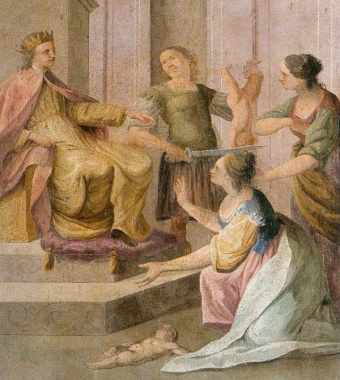Meaning of Numbers: The Number 138
The English phrase "hundred and thirty and eight," used for the number 138, is not recorded in the King James Bible.
The possible meaning of the number 138 is derived from the Psalms and the occurrence of certain Hebrew words in the Old Testament's original text.
Hebrew entry 138 in Strong's Concordance is the word adoniyah. It is written 26 times in 26 Hebrew Old Testament verses. It is, by far, most commonly found in the book of 1Kings (22 times). The word, which is a personal name spelled Adonijah in the KJV, means "worshipper of Jah" or "my Lord is Jehovah."
There are three Biblical people named Adonijah. One of them was a Levite during the reign of Judah's King Jehoshaphat who ruled from 872 to 848 B.C. (2Chronicles 17:8). The second was a man who sealed a covenant in Nehemiah 10:16.

The third, and most important, person named Adonijah was the fourth son of King David through a woman named Haggith. He was born when David was living in Hebron after the death of King Saul (2Samuel 3:2 - 4).
Adonijah became Biblically notorious, as David was nearing death (1Kings 1:1), for trying to usurp Solomon's right to inherit Israel's throne.
And Adonijah the son of Haggith exalted himself, saying, "I will be king." Then he prepared for himself chariots and horsemen, and fifty men to run before him (1Kings 1:5, HBFV).
Adonijah's secret efforts to gather support from the people, including from David's general and one of the High Priests, draws the attention of Nathan the Prophet. Both Nathan and Bathsheba then inform King David of the plot, who afterwards has his son Solomon publicly anointed king (1Kings 1:28 - 39).
Solomon, after the death of his father David, promises Adonijah he will spare him his life if he behaves himself. Adonijah, however, soon acts foolishly and his life is ended (1King 2:13 - 25).
Appearances of Number One Hundred Thirty Eight
In 138 A.D. Roman Emperor Hadrian died and was succeeded by Antoninus Pius. Hadrian is considered the third of five "good emperors" who ruled the empire during its peak of power and wealth.
The good emperors of Rome began with Nerva in 96 A.D. and ended when Marcus Aurelius died in 180. Hadrian's Wall, started in 122 A.D., was built in the northern part of England to demark the boundary between territory Rome controlled (south of the wall) with lands it had yet conquered that lied north.
Greek entry 138 in Strong's Concordance is the word aihreomai. Used only three times in the New Testament, it is translated as a variation of "choose" in the King James Bible translation.
But if I live in the flesh, this is the fruit of my labor: yet what I shall choose (aihreomai) I wot not (Philippians 1:22, KJV).
By faith Moses, when he was come to years, refused to be called the son of Pharaoh's daughter; choosing (aihreomai) rather to suffer affliction with the people of God, than to enjoy the pleasures of sin for a season (Hebrews 11:24 - 25, KJV).
Number 138 and the Psalms
Psalm 138, written by King David, promises to praise God for his love and kindness. It also conveys great confidence that the Lord will save him from all his enemies.
I will praise you, O Lord, with all my heart; before the "gods" I will sing your praise. I will bow down toward your holy temple and will praise your name for your love and your faithfulness, for you have exalted above all things your name and your word . . .
Though I walk in the midst of trouble, you preserve my life; you stretch out your hand against the anger of my foes, with your right hand you save me (verses 1 - 2, 7 of Psalm 138, NIV).
More Info on Biblical Meaning of 138
There is 1 word in the Bible's original languages that is recorded exactly 138 times.
God commanded ancient Israel to keep a Sabbatical year, also known as the land sabbath (Leviticus 25:2 - 6) or year of release (Deuteronomy 31:10). This year was the seventh in every seven-year cycle. It began (likely) on Tishri 1 on the Hebrew calendar (Feast of Trumpets aka Rosh Hashanah).
A Sabbatical year began on September 3 in 137 A.D. This special year ended on September 23 in 138 A.D.
138 is equal to 2 x 3 x 23. 2, 3 and 23 are all prime numbers.
138 is also the addition of two consecutive prime numbers (67 and 71) as well as the addition of four primes (29, 31, 37 and 41).
The English word "fifty" is written 157 times in 138 King James Bible verses. It is recorded the most in the book of Numbers (33 times) followed by 2Kings (21) and Exodus (20). Its first use is related to the building of Noah's Ark.
Make thee an ark of gopher wood; rooms shalt thou make in the ark, and shalt pitch it within and without with pitch. And this is the fashion which thou shalt make it of: The length of the ark shall be three hundred cubits, the breadth of it fifty cubits, and the height of it thirty cubits (Genesis 6:14 - 15, KJV).
Peradventure there be fifty righteous within the city: wilt thou also destroy and not spare the place for the fifty righteous that are therein? . . .
And the Lord said, If I find in Sodom fifty righteous within the city, then I will spare all the place for their sakes (Genesis 18:24, 26, KJV).